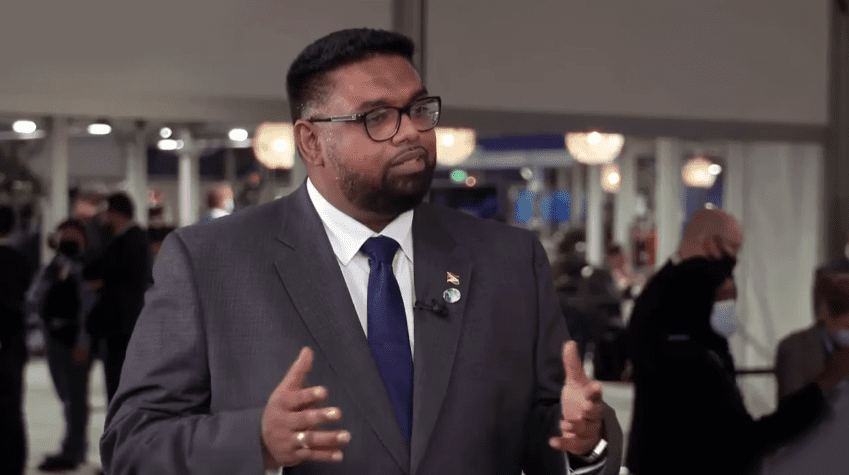“For us, it is a question of survival,” Guyana’s President, Dr. Mohamed Irfaan Ali said, of small, climate-vulnerable countries, in his address to the 26th Conference of Parties (COP26) on Climate Change in Glasgow, Scotland on Tuesday morning.
The Head of State stressed, “Climate change affects us all. Rich, poor, developed and developing states. But its effects are more severe on the poorest and most vulnerable, especially small island developing states, and low-lying coastal states.”
On this note, the President urged world leaders to come to grips with the reality that the fate of civilization resides in the decisions made in Glasgow, and that the climate has given the world an ultimatum – ‘take action or face an infernal global disaster’. He said the current decade needs to be one of decisive action.
The President then proffered that immediate action is needed on three fronts.
“First, we must set more ambitious goals to reduce emissions, and we must honour to the letter, those ambitions. All countries have an obligation to act, but the world’s foremost polluters have a greater duty to institute steeper emissions cuts,” he said.
His second point was for the developed world to honour its pledge to provide US$100 billion to the most vulnerable states for their climate and adaptation measures. He recalled that this pledge was made by developed countries at COP15 in 2019 at Copenhagen, Denmark. On this note, the President cautioned that, “Dishonoured pledges are a recipe for disaster.”
Lastly, the President advocated for the rules of carbon markets and REDD+ (Reducing emissions from deforestation and forest degradation) to be sorted for the benefit of countries which have preserved their forest endowments. He said, mindful that deforestation contributes 16% to annual global emissions, “Forest rich countries must be provided with the incentives necessary to keep their forests intact and to reduce deforestation and forest degradation.”
The Head of State was keen to note that Guyana will maintain its forests, the size of England and Scotland combined, storing 20 gigatons of carbon as a global asset.
“We’ll work with local communities in conserving, protecting and sustainably managing our forest, biodiversity and freshwater supplies. We’ll decouple economic growth and emissions through a progressively cleaner energy mix with the aim of reducing our carbon emissions by 70% by 2030. We’ll invest in low carbon opportunities for jobs, ecosystem services, and social inclusion through an expanded Low Carbon Development Strategy (LCDS).”
He also reiterated the country’s support for removal of fossil fuel subsidies and advocated for a strong global carbon tax.
The Guyanese President also iterated his support for various international groups which have met to deliberate on climate matters leading up to COP26. These include the Caribbean Community, the Alliance of Small Island States (AOSIS), the Community of Latin America and Caribbean States (CELAC), the Leticia Pact, the Dhaka-Glasgow declaration, and the Glasgow leaders’ declaration on forest and land use.
“We are at a historic moment in our civilization,” Mr. Ali said. “History must not judge us as having only counted our losses. It must instead, herald our effort to confront one of our planet’s greatest threats – climate change.”



